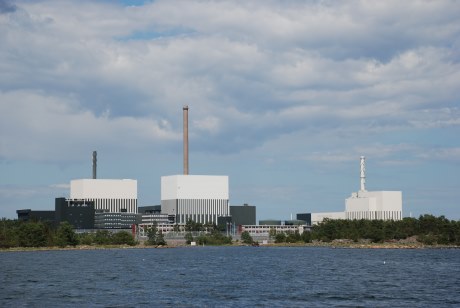Unit 2 of the Oskarshamn nuclear power plant in Sweden would close by 2020, with unit 1 shutting between 2017 and 2019, under a proposal announced today by majority owner EOn. Minority owner Fortum opposes the early shutdown of the units.
 |
| The three-unit Oskarshamn plant (Image: OKG) |
EOn, which owns 55% of plant operator OKG, said there is a "lack of economic opportunities" for investment in the operation of Oskarshamn 2 beyond 2020. It is therefore calling on the board of OKG to begin the decision making process for the closure of both units 1 and 2.
According to EOn, Oskarshamn 2 - a 638 MWe boiling water reactor (BWR) which began operating in 1974 - has been "in great need of modernization and replacement of components to extend its operating life." It added, "It would require large investments to Oskarshamn 2 to meet new requirements for core cooling which take effect after 2020."
EOn's decision comes just days after OKG applied for an environmental court ruling in preparation for the future decommissioning of Oskarshamn unit 1, a 473 MWe BWR that started up in 1972.
In today's announcement, EOn said that the closure date for unit 1 remains uncertain "but is estimated to occur sometime in the period 2017-2019". It noted the exact timing will depend on how the environmental assessment process goes and is also subject to a decision by the OKG board.
EOn Sweden CEO Jonas Abrahamsson said, "The conditions for the electricity market have changed significantly in recent years. Historically and permanently low electricity prices, combined with increased output tax on nuclear power, and additional requirements for extensive investments create profitability issues, particularly for small reactors such as Oskarshamn 2."
He added, "With the current economic and political conditions, the trend is clear - we will see fewer but larger reactors. Oskarshamn 3 - which is one of Sweden's largest reactors, producing more electricity than both units 1 and 2 together - will therefore have a strategic importance for stability in Sweden's electricity supply for a long time to come."
Oskarshamn 3 is a 1400 MWe BWR which began operating in 1985. Between them the three units at Oskarshamn generate about 10% of Sweden's electricity.
However, Finland's Fortum - owner of the remaining 45% of OKG - says it would prefer the continued operation of the two older Oskarshamn units.
Fortum executive vice president for nuclear and thermal power Tiina Tuomela said, "Contrary to EOn's view, we believe that it is possible to continue production from Oskarshamn units 1 and 2 until the end of their planned operational lifetimes."
She added, "The recent modernization investments in Oskarshamn 2 have been carried out with a target to continue production until the end of the unit's lifetime and with increased capacity. Considering the investments made, as well as our strong expertise as a nuclear operator and a global service provider, we see that there are other measures [that could be] taken to ensure safe and reliable production at Oskarshamn 2 till the end of its planned lifetime."
In a statement Fortum said, "Continuing production at Oskarshamn 1 and 2 would be beneficial for all parties. It would give more time to increase CO2-free energy production and to secure energy supply for the Swedish industry and society as a whole."
A formal decision by OKG's board of directors on whether the proposed closure will be implemented or not is expected to be taken later this year, OKG said. EOn noted the exact timing of decisions will depend on forthcoming negotiations with trade unions.
Fortum said that once the OKG has made a decision on the early closures it will then assess the impacts of that decision.
Researched and written
by World Nuclear News




_87299.jpg)
_52351.jpg)








